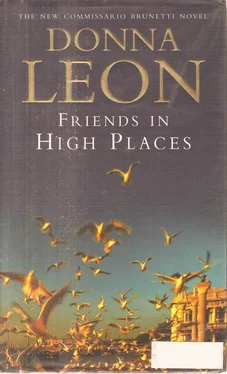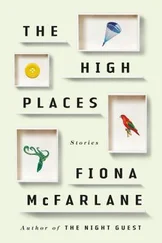The pilot looked back at the men on deck, lowered one hand from the wheel, and the noise of the siren was cut off. It seemed to Brunetti that the pilot urged the boat to greater speed, but he stopped himself from saying anything. At the back of the Arsenale, Pertile swung sharply to the left and past the usual stops: the hospital, Fondamenta Nuove, La Madonna dell’Orto, San Alvise, and then turned into the beginning of the Cannaregio Canal. Just after the first boat stop, they saw a police officer standing on the riva and waving to them as they approached.
Vianello tossed him the rope, and he bent to fix it to an iron ring. When he saw Brunetti, the officer on the riva saluted, then extended a hand to help him from the boat.
‘Where is he?’ Brunetti asked as soon as his feet were again on firm ground.
‘Down this calle, sir,’ he said, turning away from Brunetti and into a narrow street that ran back from the water toward the interior of Cannaregio.
The others filed off the boat, and Vianello turned to tell Pertile to wait for them. Brunetti walking next to the officer, the others in single file behind them, they started down the narrow calle.
They didn’t have far to go, and they didn’t have any trouble in finding the right house: about twenty metres along, a small crowd of people stood clustered in front of a doorway, in which a uniformed officer stood, arms folded.
As Brunetti approached, a man broke away from the crowd but made no attempt to walk toward the policemen. He simply moved away from the others and stood still, hands on his hips, watching the police draw near. He was tall, almost cadaverous, and had the worst drinker’s nose Brunetti had ever seen: inflamed, enlarged, pitted, and virtually blue at the end. It made Brunetti think of faces he’d once seen in a painting by some Dutch Master – was it of Christ carrying His cross? – horrible, distorted faces boding nothing but pain and evil for all who came within their malignant compass.
In a low voice, Brunetti asked, ‘That the man who found him?’
‘Yes, sir,’ answered the policeman who had met the boat. ‘He lives on the first floor.’
They approached the man, who stuffed his hands into his pockets and started to rock back and forth on his heels, as if he had important work to get on with and resented the police for keeping him from it.
Brunetti stopped in front of him. ‘Good morning, sir. Is it you who called us?’ he asked.
‘Yes, I did. I’m surprised you took the trouble to get here so fast,’ he said, his voice as filled with rancour and hostility as his breath was with alcohol and coffee.
‘You live below him?’ Brunetti asked neutrally.
‘Yeah, I’ve been there for seven years, and if that shit, my landlord, thinks he can get me out by giving me an eviction notice, I’ll tell him where he can shove it.’ He spoke with the accent of Giudecca and, like many of the natives of that island, seemed to think that scurrility was as essential to speech as air to breathing.
‘How long has he lived here?’
‘Doesn’t live here any more, does he?’ the man asked and bent over to engage in a prolonged laugh that ended in a bout of coughing.
‘How long had he lived here?’ Brunetti asked when the man stopped coughing.
The man stood upright and took a closer look at Brunetti. In his turn, Brunetti observed the white patches that peeled away from the reddened skin of the man’s face and the yellowed eyes that told of jaundice.
‘A couple of months. You’ll have to ask the landlord. I just saw him on the stairs.’
‘Did anyone come to visit him?’
‘I don’t know,’ the man said with sudden truculence. ‘I keep my business to myself. Besides, he was a student. I don’t have anything to say to people like that. Little shits, think they know everything.’
‘Did he behave like that?’ Brunetti asked.
The man considered this for a moment, surprised at having to examine a specific case to see if it conformed to his general prejudice. After a long time, he said, ‘No, but like I told you, I just saw him a few times.’
‘Give your name to the sergeant, please,’ Brunetti said and turned away, indicating the young man who had greeted the boat. He walked up the two steps that led to the front door, where he was saluted by the officer standing there. From behind him he heard the man he’d questioned call out, ‘His name was Marco.’
When Vianello approached, Brunetti asked him to see what he could learn from the people in the neighbourhood. The sergeant turned away and the officer stepped forward. ‘Second floor, sir,’ he said.
Brunetti looked up the narrow staircase. Behind him, the policeman snapped on the light, but the low-wattage bulb made little difference, as if reluctant to illuminate the general squalor. Paint and cement had flaked off the walls and been kicked into small dunes on either side by the people who used the stairs. Here and there, cigarette butts and bits of paper lay on top of or stuck out from the dunes.
Brunetti climbed the steps. The smell met him on the first landing. Close, dense, penetrating, it spoke of rot and vileness and something inhumanly unclean. As he drew closer to the second floor, the smell grew stronger, and Brunetti had a terrible moment in which he visualized the avalanche of molecules, falling over him, clinging to his clothing, cascading into his nose and throat, always carrying with it the horrible reminder of mortality.
A third policeman, looking very pale in the dim light, stood at the door to the apartment. Brunetti was sorry to see that it was closed because it meant the smell would be much worse when they opened it again. The officer saluted and stepped away very quickly, and didn’t stop until he was four steps from the door.
‘You can go downstairs,’ Brunetti said, aware that the boy must have been there for almost an hour. ‘Go outside.’
‘Thank you, sir,’ he said and saluted again before walking very quickly around Brunetti and launching himself down the stairs.
Behind him, Brunetti heard the various clumps and clatters of the technical team as they carried up their bags of tools.
He resisted the impulse to draw a deep breath; instead he drew up his courage and reached for the door. Before he could open it, however, one of the technical men called out, ‘Commissario, take this first.’ When Brunetti turned, the man was ripping open the plastic covering around a surgical mask. He handed one to Brunetti, then one to his colleague. They all slipped the elastic strings around their ears and pulled the masks up over their mouths and noses, all of them glad to breathe in the sharp odour of the chemicals with which the masks had been treated.
Brunetti opened the door, and the smell assaulted them, slicing through the chemicals. He glanced up and saw that all of the windows had been opened, probably by the police, and that the crime scene was, in a sense, contaminated. There was, however, little need to protect this scene; Cerberus himself would have fled, howling, from the smell.
His body stiff with the desire not to move, Brunetti stepped through the door, and the others crowded in after him. The living room was what he would have expected to find in the apartment of a student: indeed, it reminded him of the way his friends had lived when they were at university. A battered sofa was covered with a length of colourful Indian cloth, tossed over the back and tucked in tight under the seats and beside the arms to make it look like upholstery. A long table stood against the wall, its surface covered with papers, books, and an orange on which green mould had begun to grow. Books and an assortment of clothing covered two other chairs.
The boy was on the floor of the kitchen, sprawled on his back. His left arm was flung out behind his head, the needle that had killed him still stuck into the vein of his arm, just below the turn of the elbow. His right hand was curved around the top of his head, and Brunetti recognized the gesture his son made whenever he realized he had made a mistake or done something stupid. On the table lay what was to be expected: a spoon, a candle, and the tiny plastic envelope that had held whatever killed him. Brunetti turned his eyes away. The open window of the kitchen looked across at another window, shuttered and blind.
Читать дальше











